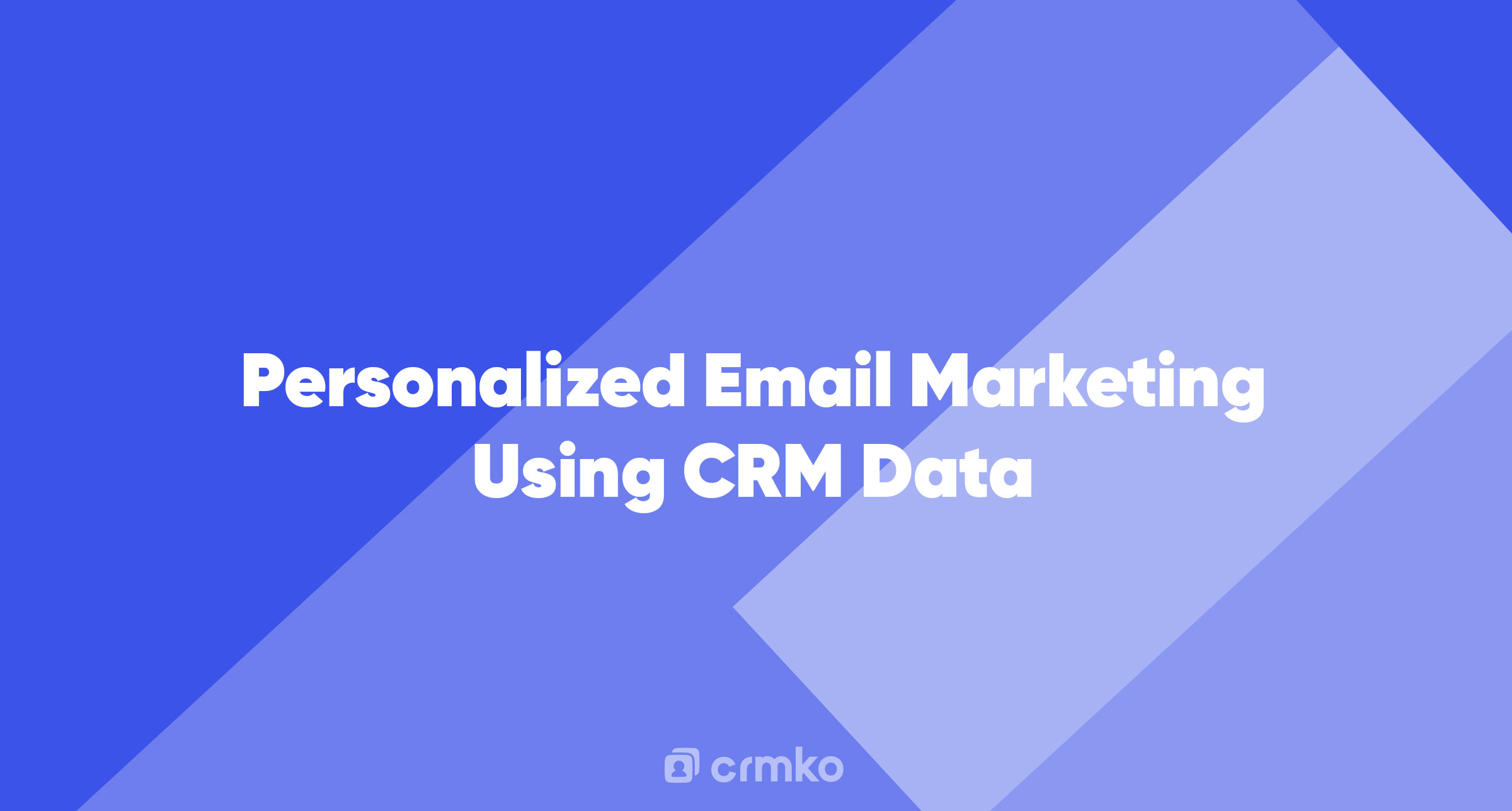Before diving into the specifics of using CRM data for personalized email marketing, let's take a moment to understand why personalization is crucial in today's marketing landscape. Personalized email communications offer several significant advantages:
- Adding a Human Touch: Personalization humanizes your brand, making your emails more relatable and engaging. By addressing recipients by their names and tailoring content to their preferences, you create a more personalized and intimate connection.
- Building Stronger Connections: Personalized emails help strengthen relationships with recipients, building trust and loyalty. This is particularly important in B2B and SaaS sectors, where personalized communication can make a significant impact on customer retention and satisfaction.
- Increasing Conversion Rates: By leveraging CRM data, you can gain insights into a customer's past purchases and behavior. This enables you to send relevant emails with personalized offers, increasing the chances of conversion and driving higher sales.
- Boosting Customer Loyalty: When customers receive personalized offers and recommendations, they feel valued and understood. This fosters customer loyalty and encourages repeat purchases, ultimately increasing the lifetime value of your customers.
- Gaining a Competitive Edge: Effective utilization of CRM data allows you to tailor your emails according to each customer's preferences and needs. This level of personalization gives you a competitive advantage, setting you apart from other businesses in your industry.
Now that we understand the significance of personalization in email marketing, let's explore how you can harness the power of CRM data to create highly personalized email campaigns.
Leveraging CRM Data for Personalized Email Campaigns
1. Segmenting Emails Based on the Buyer's Journey
Not all prospects are at the same stage in the buyer's journey. Some may be in the early awareness stage, while others are ready to make a purchase decision. To effectively personalize your email campaigns, it's crucial to segment your audience based on their position in the funnel. CRM data can provide valuable insights into a prospect's journey, allowing you to send targeted emails that align with their specific needs and interests.
CRM tools like Marketo and Salesforce offer lead scoring models and AI-driven predictive analytics, enabling you to identify a prospect's stage in the buyer's journey. By analyzing factors such as the source of entry, time elapsed since the first interaction, inquiries made, and resources accessed, you can tailor your emails accordingly. For example, you can send educational content to leads in the awareness stage and promotional offers to those in the decision stage.
2. Customer Retention and Upsell Campaigns
While acquiring new customers is essential, it's equally important to focus on retaining and upselling to your existing customer base. CRM data can help you identify opportunities for upselling by analyzing a customer's purchase history and preferences. For instance, if a customer has purchased the basic version of your product, you can target them with emails promoting the premium plan and highlighting advanced features.
Calendly, an online scheduling tool, effectively utilizes upsell campaigns by notifying customers of their free trial expiration and encouraging them to upgrade to a paid plan. By leveraging CRM data, you can personalize these upsell emails based on each customer's specific usage and needs, increasing the chances of conversion.
3. Personalized Offers and Discounts
In the e-commerce sector, sending personalized offers and discounts to frequent buyers can significantly boost customer loyalty and increase sales. By analyzing CRM data on customer spending habits, you can create different membership tiers and reward customers based on their purchasing behavior. This not only incentivizes repeat purchases but also enhances the overall customer experience.
Carnival Cruise Line, for example, offers exclusive discounts and offers to frequent travelers through their VIFP club. By personalizing these offers based on a customer's loyalty tier, they create a sense of exclusivity and encourage continued engagement with the brand.
4. Referral Programs and Word-of-Mouth Marketing
Referral marketing is a powerful strategy for acquiring new customers and fostering brand advocacy. By leveraging CRM data, you can identify your most active and loyal customers who are likely to become brand evangelists. Implementing a referral program allows you to incentivize customers to spread the word and refer their friends and family.
Maude, a modern sexual wellness brand, effectively utilizes referral marketing by offering incentives to customers who refer others. Their referral email includes clear calls to action and social sharing links, making it easy for customers to share the offer with their network. By tracking the referral process and acknowledging customers' efforts, you can nurture these valuable relationships and drive new customer acquisition.
5. Automating Workflow for Special Occasions and Milestones
CRM data can help you track important dates, such as birthdays, anniversaries, and holidays, allowing you to send personalized emails and offers to celebrate these milestones with your customers. By setting up automated workflows, you can ensure timely and personalized communication without the need for manual intervention.
Sending reminder emails with special offers on a customer's birthday, for example, shows that you value their relationship and enhances their overall experience with your brand. By leveraging CRM data and automation, you can build stronger customer relationships and nurture long-term loyalty.
Conclusion
Personalized email marketing using CRM data is a powerful strategy for engaging customers, boosting conversions, and fostering brand loyalty. By leveraging CRM insights, you can segment your audience, create targeted campaigns, and deliver personalized offers and recommendations. The key is to harness the wealth of customer data available to you and use it to create meaningful, tailored experiences for each individual recipient.
Remember, personalization is not just about addressing recipients by their names—it's about understanding their preferences, needs, and journey with your brand. By effectively utilizing CRM data, you can create highly personalized email campaigns that resonate with your audience, driving higher engagement, and ultimately, achieving your marketing goals. So, embrace the power of CRM data and unlock the full potential of your email marketing efforts.
